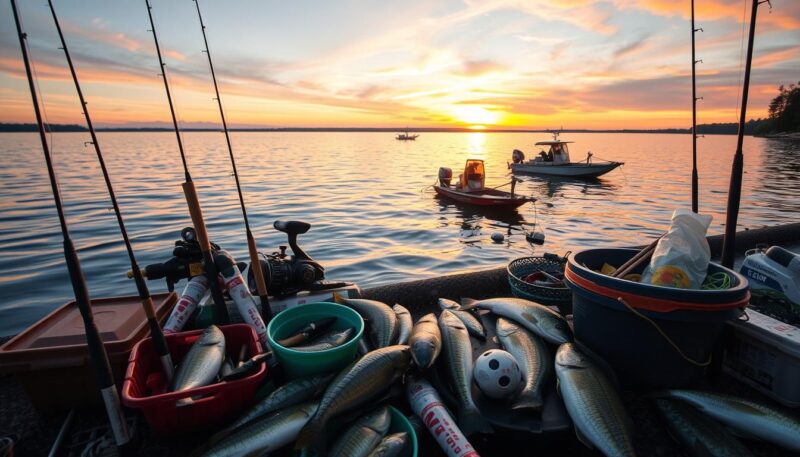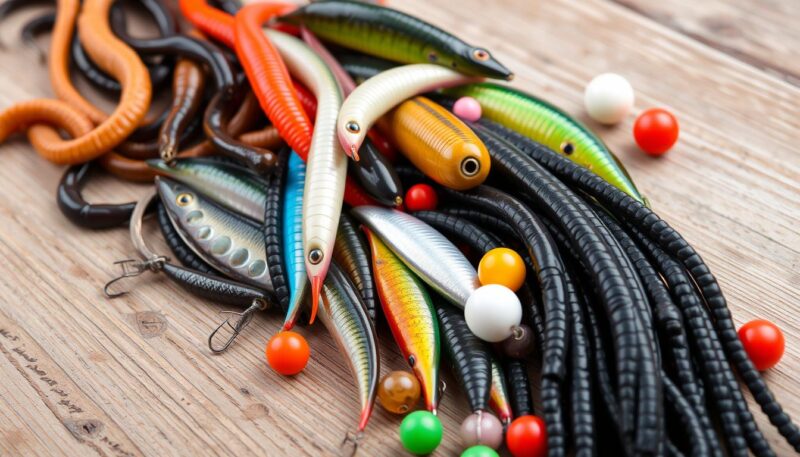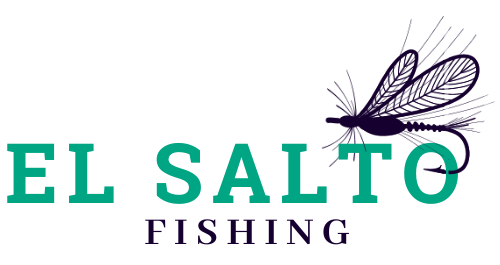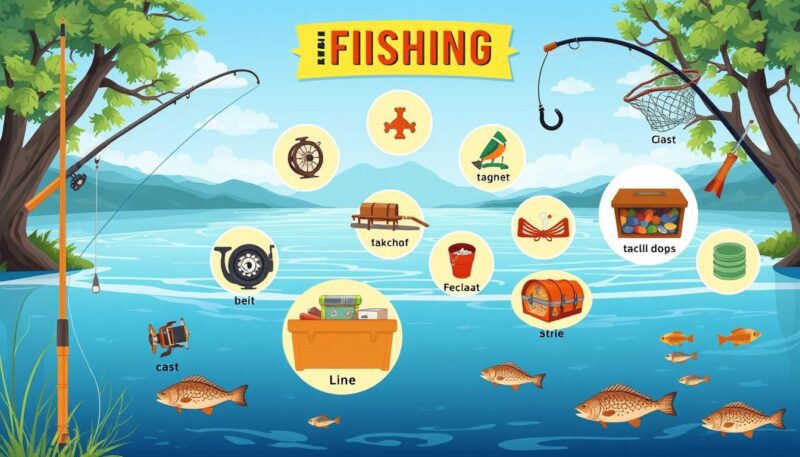Welcome to the world of fishing! If you’re just starting out, one of the most essential skills you’ll need to master is understanding fishing terminology for beginners. Being familiar with the right words and phrases not only boosts your confidence but also enhances your communication with experienced anglers. Whether you’re trying to explain your latest catch or seeking advice on how to choose the right bait, knowing the correct fishing terms glossary can make all the difference.
Imagine being out on the water, surrounded by fishing enthusiasts who effortlessly throw around phrases like “backcast” and “leader.” Without a grasp of these foundational words, it might feel intimidating. However, learning the basics of fishing language explained can greatly enrich your experience, helping you bond with fellow fishermen and even improve your technique.
In this guide, you’ll discover pivotal concepts in fishing jargon, from the types of bait you should consider to the various methods you can employ to catch that elusive trophy fish. Grasping these beginner fishing terms can provide a solid foundation that will serve you well on all your angling adventures. So, let’s dive into the sea of fishing knowledge!
Understanding Fishing Terms: A Beginner’s Guide
As a newcomer to fishing, having a solid grasp of essential fishing vocabulary is crucial for enhancing your overall experience. Familiarity with basic fishing terminology will empower you to communicate effectively with fellow anglers and make informed decisions while on the water. This guide offers an overview of fundamental fishing terms as well as insights into various types of fishing methods.
Basic Fishing Vocabulary
Understanding fishing jargon begins with learning some core concepts. Here are some of the key terms that every beginner should know:
- Bait: Organic substances used to attract fish. This can include worms, eels, and a range of artificial options.
- Lure: A device designed to attract fish through movement or appearance.
- Hook: A metal instrument used to catch fish by impaling them.
- Cast: The action of throwing bait or a lure into the water.
- Pound Test: A measurement that indicates the strength of a fishing line. Selecting the right pound test ensures you can handle the weight of your catch.
Types of Fishing: Key Terms
The world of fishing encompasses various methods and techniques, each with its own set of terminology. Here are some important categories and terms:
- Spinning Reels: The most common reel type used by beginners, known for their versatility and ease of use.
- Fly Fishing: A method that requires specific terminology, often confusing for newcomers.
- Bait Fishing: This involves using organic materials to entice fish and is popular among new anglers.
- Casting Techniques: Includes different methods such as spinning and baitcasting.
- Deep-Sea Fishing: Refers to fishing in ocean waters, requiring specialized gear and terminology.
| Term | Definition |
|---|---|
| Bait | Organic or artificial substances used to attract fish. |
| Lure | An artificial device designed to mimic prey. |
| Hook | A sharp metal instrument that secures the catch. |
| Cast | The technique for throwing bait or lures into the water. |
| Pound Test | The strength of the fishing line, crucial for securing your catch. |
Common Fishing Phrases You Should Know
Understanding fishing slang and common fishing phrases enhances your ability to engage in conversations with seasoned anglers. The informal language creates a sense of camaraderie among fishing enthusiasts, allowing you to feel more comfortable. This section explores everyday slang used by anglers and highlights regional variations of fishing terminology, enriching your overall fishing language explained.
Everyday Slang Used by Anglers
Fishing brings with it a unique set of terms that can bewilder newcomers. Familiarity with this fishing terminology guide allows you to engage in discussions. Here are some key phrases:
- Skunked: Refers to a fishing trip where no fish are caught.
- Hooked up: Indicates that an angler has caught a fish.
- Greenhorn: A term for a new or inexperienced fishing mate.
- High Hook: The captain who catches the most fish on a trip.
- Covered Up: A scenario where multiple fish are biting, showcasing an abundant fishing environment.
Regional Variations of Fishing Terminology
Fishing slang varies significantly across regions, reflecting local culture and traditions. This geographical diversity in how to talk fishing can influence terminology. Here are a few examples:
- Jack Bag: Used in North Carolina to describe an inexperienced fisherman.
- Kurt: A local term for going over the fishing limit.
- Dunkaroo: A practice believed to attract more fish, blending superstition and tradition.
- Clutch: A term often used in Southern fishing culture.
- Fence Panda: Refers to a largemouth bass over 5 pounds, particularly in southern states.

Essential Fishing Vocabulary for Beginners
Understanding the various types of bait and lures is crucial when fishing for newbies. Knowing what works best in different situations can significantly enhance your fishing experience. The world of fishing boasts a wide array of options, from live bait like worms and minnows to artificial lures designed to imitate the movement of prey. Familiarizing yourself with the distinctions between topwater lures, crank baits, and spinner baits will prepare you for various fishing techniques.
Types of Bait and Lures
When diving into fishing language explained, there are several key types of bait and lures to consider:
- Live Bait: Species like worms and minnows.
- Artificial Lures: Designed to mimic prey.
- Topwater Lures: Float on the water’s surface, ideal for catching aggressive fish.
- Crank Baits: Dive below the surface and imitate injured fish.
- Spinner Baits: Create vibration and flash to attract fish.
These bait options can influence the success of your fishing trips, making it important to understand the specific applications of each in different conditions.
Fishing Techniques and Equipment Terminology
Mastering fishing techniques and equipment terminology is essential for all beginners. Here are some fundamental terms to know:
| Techniques | Description |
|---|---|
| Trolling | Pulling bait along behind a moving boat. |
| Jigging | Up-and-down movement of bait to attract fish. |
| Still Fishing | Fishing with a stationary bait or lure. |
In addition to these techniques, understanding gear terminology is vital. Some important terms include:
- Reel: The device used to wind and store fishing line.
- Line: The main component that connects you to the fish.
- Rod: A long, flexible stick used to cast your line.
- Terminal Tackle: Items such as hooks and sinkers that connect to the line.

Acquiring knowledge in these areas enables you to communicate confidently about your fishing gear and techniques, reinforcing your skills as you embark on your angling journey.
Conclusion
In summary, this article has provided a thorough exploration of fishing terminology for beginners, essential for enhancing your fishing experience. By familiarizing yourself with the crucial fishing vocabulary and phrases, you can now confidently engage in conversations about fishing, ensuring that you don’t sound like a novice in this rich and evolving sport.
Your understanding of key concepts, like the migration patterns of anadromous and catadromous fish or the significance of the benthic zone, reflects a deeper appreciation for the aquatic environment. With this fishing terms glossary at your disposal, you’re better equipped to choose suitable gear and techniques tailored to your fishing adventures.
As you embark on your fishing journey, continue to learn and embrace the expansive lexicon of fishing. The world of fishing offers endless opportunities for growth, discovery, and camaraderie, so keep engaging with the community and sharing in the knowledge that will enhance your overall experience.

